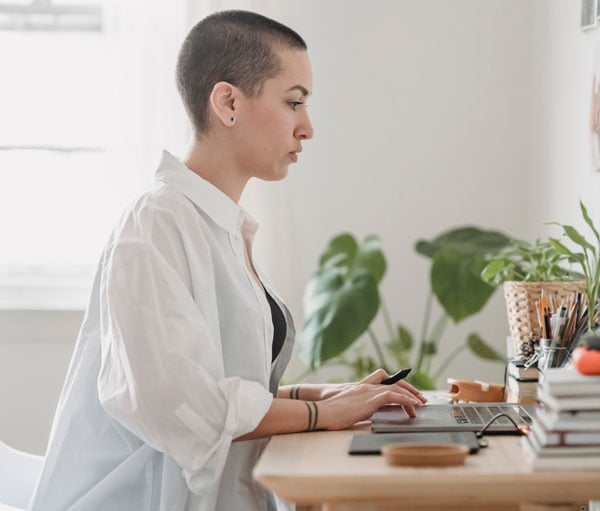“Health optimization” brings to mind the bro-y body builders you see on Insta doing high intensity interval workouts and chugging protein powder that they’re also trying to sell you. If you’re anything like us, that association may send you running for cover under your yoga mat. But hidden in between those fitspo influencers’ bulging thigh muscles is the true definition of health optimization—and it’s not as intimidating as it may sound.
We chatted with Dr. Molly Maloof, founder and CEO of Adamo Bioscience and coveted personalized medicine practitioner to entrepreneurs, investors and technology executives in San Francisco and LA, to get a realistic sense of what you can do today to optimize your health (without overhauling every part of your life).
What is Health Optimization?
Says Dr. Maloof, “Optimal health is not a destination, but a continuous process of active participation in a goal-oriented wellness lifestyle. Mastering wellness and developing the confidence to sustain our wellbeing is a journey of personal growth. The more engaged you are with your health, the more likely you will develop an inner sense of calm, have appropriate enthusiasm, be energized to do whatever task is at hand, have confidence in your abilities and feel focused when you need to be. It is important for you to have an accurate perspective of where you are on the continuum and whether you are heading in a direction of illness or wellness.”
"Optimal health is not a destination, but a continuous process of active participation in a goal-oriented wellness lifestyle." -Dr. Molly Maloof
That spectrum is key to Dr. Maloof’s practice and it’s the foundation of each client’s first appointment. In her concierge medical practice, she combines her investigative medical research skills with lessons learned from a variety of medical disciplines, including biomedicine, culinary medicine, functional medicine and integrative medicine.
“I believe health exists on a spectrum of sick to optimally well,” Dr. Maloof says. “Most people settle for a neutral or a slightly poor state of health. As we grow older, we begin developing minor symptoms and silent signs of chronic disease. I believe it is important to ask why the symptoms are there in the first place to identify the underlying cause of your issues. It’s a dynamic process. People are like race cars with high-powered engines—we need pit stops, but most of us aren’t taking them. [Health optimization] isn’t about a destination; it’s about active participation in daily rituals.”
10 Daily Rituals for Optimizing Your Health
When you continue to optimize your health, says Dr. Maloof, you also optimize your cells for more energy and you optimize your capacity for work, for relationships, for life. “I’ve been applying the theories I teach in my practice to myself and I have more capacity and energy than I did 10 years ago,” Dr. Maloof says. These are her recommended actionable steps, in her own words, you can apply to your life for health optimization.
Figure Out Your Health Habits
What are your current health habits? What are you already doing consistently? Stop smoking, reduce your drinking and get enough sleep. Focus on the simple stuff—you’ll get the most bang for your buck.
Sleep Better
Sleep is non-negotiable. If you’re sleeping poorly, focus on that alone. Quit caffeine, deal with stress during the day so it doesn’t overflow into your sleep, stop using screens in the evening, and get light in the morning and light in the evening. Most importantly, create (and stick to!) a routine. Don’t disrupt your patterns. Go to sleep at the same time on the weekends as you do on weeknights. Sleep is key to immune and metabolism function, so if sleep isn’t consistent start there.
"Sleep is non-negotiable. If you’re sleeping poorly, focus on that alone." –Dr. Molly Maloof
Focus on Oral Health
Even before you run labs or dive into diagnostics, make sure you’re brushing your teeth twice a day, flossing every day and scraping your tongue. So much inflammation can start in the mouth. If you’re not doing these basic oral health routines, add them into your daily rituals.
Be Mindful About Your Food
I believe the single most important thing you can to do optimize your health is to nourish your body daily with high quality food. A lot of people don’t think about their food intake, but the simple adage of making sure you’re eating more fruits, veggies, nuts, seeds and meat (and less processed foods) is a good place to start. Try just eating those foods for a month, and then reintroduce beans, grains and dairy to see if you feel differently.
Incorporate Movement
Our muscles are like battery packs. Without movement, they lose juice and energy. To avoid frailty, you have to move your body. And movement helps balance blood sugar, so it’s a double benefit. Again, find tactical ways to add movement into your daily routine, even outside of a serious sweat session. Try to sit less by setting an alarm on your phone. Drink more water, so you have to get up to refill or go to the bathroom more. Take meetings while you walk or pace. Get a fitness tracker to help you log your movement.
Reduce Stress
Stop stressing so much! Yeah, I know—that’s not an easy ask. Start by figuring out what your biggest stressors and triggers are. Then look at things tactically. What can you do to reduce those? For instance, a lot of my clients work seven days a week. I tell them that’s not sustainable and one tactical way to reduce stress is to have at least one day off from work per week.
Take Supplements
Everyone can benefit from these basic supplements:
Omega-3 (if you’re not eating high-quality fish regularly)
Vitamins D + K
Vitamin A
B Complex
Dopamine boosters (fish oil, magnesium, L-theanine)
GABA
5-HTP
Tryptophan
PEA
If that feels overwhelming to start all at once, figure out what’s actually doable for you, and begin there. Getting genetic testing to see what your specific nutrient sensing pathways are can also be helpful.
Use a Health Tracker
I think we’re at a critical mass for more people to use continuous glucose monitors (CGMs). Traditionally used for diabetics to track their blood sugar levels, CGMs have more recently been used in integrative medicine to help prevent future dysfunction. These trackers monitor your blood sugar levels and show spikes and declines—so you can make connections between what you’re eating and how you’re feeling.
If that’s a little too tech-y for you, start with something like a Fitbit, an Apple Watch or an Oura Ring. Perfect world medicine is too expensive. With trackers like a glucose monitor or an activity monitor, you can get the data you need to change your health at a more affordable price.
Disconnection is an epidemic we’re dealing with right now. Loneliness is a symptom of that epidemic, and building community and strong relationships is the antidote.
Build Your Community
The biggest level of health is your relationships—who you spend time with. We have an intrinsic sense of safety when we have community. Disconnection is an epidemic we’re dealing with right now. Loneliness is a symptom of that epidemic, and building community and strong relationships is the antidote.
Go to Therapy/Heal Your Core Wound
A threat to that community is our trauma. Gen Z and Millennials are embracing therapy in a way we haven’t seen before. And the acknowledgement that we need it is a step towards healthier relationships (and health optimization).
Our trauma is a factor in other areas of health where we might fall short. For instance, our food choices can be related to our trauma. Food equals comfort. When we’re triggered, we might make choices that aren’t with our best health in mind. But if you can talk through your trauma and reduce your trauma response, you’ll be able to make better, healthier choices for yourself.
Our psychology is so connected to our physical health. And things like intergenerational trauma in our relationships is something most people aren’t even acknowledging yet. We forget to ask our parents about their adverse childhood events, and then consider what patterns in their parenting might be impacting our health now. What would happen if all of society acknowledged their core wound? We have a beautiful opportunity to heal—but we need to be vulnerable with the people we’re close to and not just heal individually.
Once you get some traction in a behavioral change, it makes other changes easier. The first step is acknowledging you could use improvement. And the goal is to make healthy choices unconsciously.

Meet the first digital holistic health studio
Access thousands of live and on-demand classes for mind, body, and emotional wellbeing with a WellSet membership.

Support your team’s wellbeing with WellSet
Bring WellSet to your workplace and decrease employee burnout with the first digital holistic solution backed by insurers.
This article mentions: Health
